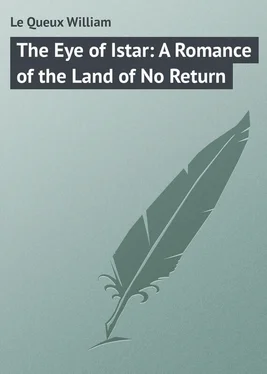William Le Queux - The Eye of Istar - A Romance of the Land of No Return
Здесь есть возможность читать онлайн «William Le Queux - The Eye of Istar - A Romance of the Land of No Return» — ознакомительный отрывок электронной книги совершенно бесплатно, а после прочтения отрывка купить полную версию. В некоторых случаях можно слушать аудио, скачать через торрент в формате fb2 и присутствует краткое содержание. Жанр: Прочие приключения, foreign_prose, на английском языке. Описание произведения, (предисловие) а так же отзывы посетителей доступны на портале библиотеки ЛибКат.
- Название:The Eye of Istar: A Romance of the Land of No Return
- Автор:
- Жанр:
- Год:неизвестен
- ISBN:нет данных
- Рейтинг книги:5 / 5. Голосов: 1
-
Избранное:Добавить в избранное
- Отзывы:
-
Ваша оценка:
- 100
- 1
- 2
- 3
- 4
- 5
The Eye of Istar: A Romance of the Land of No Return: краткое содержание, описание и аннотация
Предлагаем к чтению аннотацию, описание, краткое содержание или предисловие (зависит от того, что написал сам автор книги «The Eye of Istar: A Romance of the Land of No Return»). Если вы не нашли необходимую информацию о книге — напишите в комментариях, мы постараемся отыскать её.
The Eye of Istar: A Romance of the Land of No Return — читать онлайн ознакомительный отрывок
Ниже представлен текст книги, разбитый по страницам. Система сохранения места последней прочитанной страницы, позволяет с удобством читать онлайн бесплатно книгу «The Eye of Istar: A Romance of the Land of No Return», без необходимости каждый раз заново искать на чём Вы остановились. Поставьте закладку, и сможете в любой момент перейти на страницу, на которой закончили чтение.
Интервал:
Закладка:
Le Queux William
The Eye of Istar: A Romance of the Land of No Return
PEACE, O READER! Constant, blessed and abundant salutations .
Of a verity the groves of my hopes have been refreshed by cooling showers from the clouds of Allah’s blessing, my rose garden has been weeded of the thorns of despondency, and the tree of my prosperity has become fruit-bearing from the breeze of his bounty. He is the Giver of Gifts, the Source of Liberality, the Sovereign, the dust of whose sandals is deservedly the collyrium of the eyes of mortal men; and I, called by my fellows El-Motardjim, am the servant who, in compliance with the exalted command, have placed my finger of acquiescence on the vision of obedience. During many hopeless nights I waited for the radiation of the sun of the benefits of prosperity, and counted the stars till the rise of dawn, but, by my ill-luck and the machinations of enemies, was deprived of the felicity of penetrating the mystery of the Land Forbidden .
At length, however, on a happy day when the fire of my anguish burned so brightly that it was not easy to extinguish it with the water of patience, the Abolisher of the signs of darkness and aberration invested me with the robe of the favoured, guarded me through the calamities and vicissitudes of fortune during long journeys, directed my footsteps through the mazes of paths untrodden, and revealed unto my dazzled eyes weird and wondrous marvels stranger than men have dreamed .
Therefore, O Reader! wipe the dust of ennui and fatigue from the speculum of thy mind, withdraw the tongue of blame into thy palate, and lend a willing ear to this my Tarik; for, verily, I have elucidated the secret of the mystic Land of the No Return; I have torn the veil that hideth the Great Sin from the eyes of men, and have gazed into the Eye of Istar. “Imsh Allah !”
Thrice hath the Fast of Ramadan come and gone since the Granter of Requests last allowed my eyes to behold the well-remembered landscape, scarcely visible in the pale light of dawn. Hills, covered with tall feathery palms, rose abruptly from the barren, sun-scorched plain, and, at their foot, stood the dazzlingly-white city of Omdurman, the impregnable and mysterious headquarters of Mahdiism, while beyond, like a silver ribbon winding through the marshes, the Nile glided, half veiled by its thin white cloud of morning vapours.
Within the walled and strongly-guarded city was a scene, strange and fantastic. The air, heavy with war rumours, was rent by the deafening strokes of enormous brazen tam-tams, mingling with the loud shouts of dark-faced Jalins, half-naked negro fanatics of the Kunjara and the Dinka, armed cap à pie , ready for battle at a moment’s notice. The excitement, which had increased daily for many months, had risen to fever heat.
Throughout the short, hot night, the great nahas – those huge brass war drums of the Khalifa Abdullah, Ruler of the Soudan – had been beaten by relays of perspiring negro slaves, glittering with beads and trinkets, the indescribable monotonous rhythm causing the wildly-excited populace to cry, “ Nakelkum !” and “ Naklulkum !” as, in the fresh, cool hour, when the Wolf’s Tail – the first brushes of grey light which appear as forerunners of dawn – showed in the heavens, they seized guns, spears and shields, and rushing from their houses across the great square of Abu Anga they congregated in the wide, open space near the Tree of Hadra, where the Raya Zerga, or dreaded black standard of the Khalifa, hung ominous and motionless in the morning air.
Wild-haired men sped fleetly to and fro, brandishing their gleaming arms and apostrophising Eblis; women left their millet unbeaten and followed, while musicians chanted war songs softly in a sad falsetto, accompanying themselves upon their little ginkris – those queer, two stringed guitars, fashioned from a tortoise shell, which give forth a dismal sound like the chirping of a grasshopper of the oasis. The servants of the Merciful are those who walk meekly on the earth, and when the ignorant speak to them, answer, “Peace”; and who pass the night adoring Allah, and standing up to pray unto him, and who say, “O Allah, avert from us the torment of hell, for the torment thereof is perpetual; verily, the same is a miserable abode”; and who, when they bestow, are neither profuse nor niggardly, but observe a just medium between these, and who invoke not another god together with the One Allah, neither slay the soul which Allah hath forbidden to be slain, unless for a just cause. The Dervishes were going forth to battle.
On one side of the spacious review ground frowned the castellated walls of the imposing white fortress, held so long by Faragallah Pasha against the fierce hordes of the Mahdi; on the other, the ill-built quarters of the Genadien, or regular soldiers, while the single tree in the centre was historical by reason of the head of Gordon, the brave Pasha of the Infidels, having been exhibited thereon by order of our tyrannical lord, the Mahdi. It was at this spot that the wild multitude heaped curses upon the last grim relic of the gallant, deserted hero of Khartoum, the man whose matchless bravery and dogged perseverance were alike admired by my own co-religionists, as well as by the Infidels themselves.
But the Mahdi, Khalifat-er-Rasul – the great False Prophet, renowned throughout the world, who, by inducing us to believe that, by his supernatural influence, he could transform the bullets of the white men into water, caused us to flock to his standard and attempt to conquer the Soudan – was now dead, and the power of the Khalifa Abdullah supreme. Seven years ago had the hand of Allah’s justice fallen heavily upon the hypocritical imitator of the Great Prophet, who asserted that he could part the waters of the Nile, that his body was invulnerable, and who was so successful in his ingenious impostures that the people threw themselves down frantically to kiss the spots his crimson slippers had touched, while the water in which he performed his ablutions was drunk as an unfailing remedy for every sort of malady. The very dust of his sandals was declared to be the collyrium of the eyes of men. But the struggle with the English, the fall of El Obeid, the capture of Galabat, and the defeat and death of the King of Abyssinia were events now long past and forgotten.
In this record of fact, adventure and strange marvels, I, Zafar-Ben-A’Ziz, called by some, El-Motardjim (“the translator”), on account of my knowledge of many tongues, am compelled to speak of myself. I am not a Soudanese, but an Arab, son of the Hadj Yakub Sarraf, Kaid of the Aures. I passed my childhood at my birthplace, El-Manäa, two days’ journey from Batna. Then my father, having trading relations with an Arab merchant living in London, the giant city of the English, I was sent there for two years to learn the tongue. But I cared not for the English, nor the ways of life in a city where the women go abroad unveiled and laugh in the faces of the men, where speech is carried along wires, where light is shed by two wires in contact and where carriages are propelled along the roads without horses. Of a verity, the London of the English is a city full of marvels, infidel customs, amazing sights, and the accursed inventions of Eblis himself. To the English the One Accursed has imparted the secret of his wiles and miracles, whereby they are the powerful people on the face of the earth. After two years rubbing shoulders with the white men who believed not in the Prophet, but worshipped a cross as emblem of their deity, I grew weary, for, during the whole time, mine eyes were never refreshed by seeing the interior of a mosque, although once or twice I entered their churches without removing my shoes, as is their custom.
Читать дальшеИнтервал:
Закладка:
Похожие книги на «The Eye of Istar: A Romance of the Land of No Return»
Представляем Вашему вниманию похожие книги на «The Eye of Istar: A Romance of the Land of No Return» списком для выбора. Мы отобрали схожую по названию и смыслу литературу в надежде предоставить читателям больше вариантов отыскать новые, интересные, ещё непрочитанные произведения.
Обсуждение, отзывы о книге «The Eye of Istar: A Romance of the Land of No Return» и просто собственные мнения читателей. Оставьте ваши комментарии, напишите, что Вы думаете о произведении, его смысле или главных героях. Укажите что конкретно понравилось, а что нет, и почему Вы так считаете.












